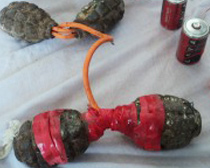TOP STORY: Program Global Shield keeps bomb-making chemicals out of terrorists?
Common chemicals like ammonium nitrate, also used as lawn fertilizer, can be transformed into improvised explosive devices (IEDs). We've seen instances of this in the 1995 Oklahoma City bombing that killed 168 people and the 2005 bombing of London's transportation system where more than 50 people died. IED attacks are on the rise, especially in Afghanistan, where IEDs continue to be the top killer of U.S. troops. In 2010, insurgents planted more than 14,000 IEDs – resulting in the deaths of 368 foreign soldiers and wounding more than 3,000 others.
Program Global Shield is an international effort to eliminate the smuggling of chemicals used in attacks like these. Conceptualized by U.S. Immigration and Customs Enforcement (ICE) in 2010, the program is being led by the World Customs Organization (WCO) in partnership with Interpol and the United Nations' Office on Drugs and Crime.
"It is an unprecedented multilateral law enforcement effort aimed at combating the illicit cross-border diversion and trafficking of precursor chemicals used by terrorist and other criminal organizations to manufacture improvised explosive devices by monitoring their cross-border movements," said Kumar Kibble, ICE deputy director.
More than 70 countries participated in the pilot program, which took place from Nov. 1, 2010 to April 30, 2011. The information-sharing that has ensued has been priceless. Global Shield marks the first time that police and customs officials from around the world have joined forces to keep these bomb-making precursor chemicals out of the hands of terrorist and criminal organizations. To date, Global Shield partners have seized more than 33 metric tons of material used to produce IEDS and made 19 arrests in various countries across the globe. Those chemicals could have manufactured thousands of IEDs.
In June 2011, the WCO and its 177 members approved a proposal for the pilot project to become a long-term program, allowing global activities to continue indefinitely.



